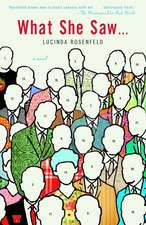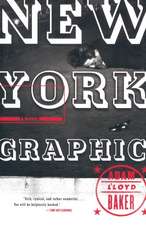The Hills at Home
Autor Nancy Clarken Limba Engleză Paperback – 31 mai 2004
As summer fades into fall, it becomes clear that no one intends to leave. But just as Lily’s industrious hospitality gives way to a somewhat strained domestic routine, the Hill clan must face new challenges together. Brimming with wit and a compendium of Yankee curiosities, The Hills at Home is an irresistible modern take on an old-fashioned comedy of manners.
Preț: 123.57 lei
Nou
Puncte Express: 185
Preț estimativ în valută:
23.65€ • 25.28$ • 19.71£
23.65€ • 25.28$ • 19.71£
Carte tipărită la comandă
Livrare economică 17 aprilie-01 mai
Preluare comenzi: 021 569.72.76
Specificații
ISBN-13: 9781400030965
ISBN-10: 140003096X
Pagini: 481
Dimensiuni: 133 x 204 x 27 mm
Greutate: 0.38 kg
Ediția:Anchor Books.
Editura: Anchor Books
ISBN-10: 140003096X
Pagini: 481
Dimensiuni: 133 x 204 x 27 mm
Greutate: 0.38 kg
Ediția:Anchor Books.
Editura: Anchor Books
Notă biografică
Nancy Clark is a native of Massachusetts and a graduate of Trinity College. This is her first novel, and she is currently at work on her next novel about the Hill family. She lives in West Wilton, New Hampshire.
Extras
Chapter One
The Hills Come Home
Outside, the night blew perfectly foul and all of the Hills had stayed home. Rain flung itself by the fistful against the clapboards, rain spangled the windowpanes, and the rain bore down so hard against the roof that shots bounced up from the slates and rained down again in shattery shards and splinters. The wind wheeled round and the startled rain skidded sideways. The rain sought, the rain battered, the rain invaded. This was an extravagant rain, as if somewhere, somehow, someone, miserly and profligate in turn, had been amassing rain until he possessed enough to hurl down fiercely and decisively upon the helplessly spinning earth.
The house stood alone out in the relative countryside of what used to be known as an old Yankee town, no longer situated so very far to the north of Boston. The house, whose rows of windows were goldenly, blurrily alight against the ragings of the night, could only be half seen, through the tattered last of the October leaves, from a high point on the River Road which was, at present, mildly flooding along its low point. Drivers-by, the few drivers-by taking the windy route easy over the shimmery beech-leaf litter lying like slippery minnows across the pavement, thought the house resembled nothing so much as an ocean liner caught in elegant passage gliding toward a farther horizon. To enhance the passers-by fancies, a sea-salt and sea-creature whiff of mudflats was conveyed upon the east wind as it soughed through an opened dashboard vent, conversational fog having whitened the windshield of a dark sedan nosing up the road.
“I understand Lily has her hands full,” said its driver, a woman who knew a little of the Hills’ situation, “with that crew she’s got there with her these days.”
“Oh?” asked her companions, encouragingly.
But if this was not a night to be out, this was not necessarily a night to be in. As the rain hardened, basins and pots were fetched from the closets where they were stored between storms and positioned beneath the usual roof leaks. The telephones kept ringing themselves, blurting or bewailingly pealing, and the electricity flickered off and on to add another element to everyone’s measure of unease. There had been a single daybright bolt of lightning and one warning growl of thunder earlier and no one in the house quite yet dared to run the risk of making toast.
They, that crew, Lily’s family, had all come for visits the summer past and none of them had gone away again in the fall. The weekend stretched into a week, the week became weeks, the weeks accumulated into a month, the months made up a season, and then the season changed. Oh, Lily ought to have been warier. Their suitcases ought to have struck her as having been very thoroughly packed as she bumped their luggage up the stairs and hefted the ornery, strapped-shut grips onto the foots of their freshly made-up beds. She ought to have let their bags languish in the front hall wherever they had dropped them, however underfoot their effects might have remained, there where they were, crumpling the carpet pattern and nicking the shaky old legs of the deacon’s bench and tripping up the careless returnees who would be too excitedly chattering and ranging about all at once on sorties of rediscovery and reclamation to mind their ways.
Surely, Lily should have made them bide their time on the terrace flagstones and finish the tall glasses of iced tea she had carried outside on an overburdened tole-ware tray. They ought to have been required to give good accounts of themselves and to stand close questions concerning the glossed-over parts of their narratives. At the very least, Lily should have let them ask which rooms were to be theirs. She ought to have leaned back on a terrace chaise and obliged them to campaign obliquely or openly, according to temperament, for assignment to the bedroom remembered as a favorite one—with a view of the river; with the framed print rendering of a nearly nude Squanto welcoming Miles Standish, overdressed in his flimsy jeweler’s-art armor, to a rather too tropically fruited and plumed New World; or, best, the big square front-facing chamber containing the electrified invalid’s bed, which, shuddering and creaking at the really determined press of a handheld button, closed up like a clamshell. They’d been sorry to learn the invalid’s bed had been rented and returned after the last wave of old people’s illnesses and deaths back in the mid-seventies. Sorry to hear, and surprised as well by Lily’s owning to the fact of a rented deathbed in a house where, as Alden said, even the fused clump of peppermint drops kept in the domed dish on the big parlor mantelpiece was, surely, the original fused clump.
Yes, there was a footing Lily ought to have established at the outset but that had never been the family’s way, for all of the Hills had been raised to regard the old house in Towne as home whether they had been reared there or in some other place. The Hills lived, if not in exile, then as self-perceived expatriates in midwestern suburbs and at New York addresses where they could be tiresome on the subject of Towne. No one else quite understood the unswerving attraction, even after they’d been shown photos of the graceful Towne green and the view from the River Road bridge, and been told about the deep-voiced frogs who lived in the swamps, and who, the Hills said, said, Mud, mud, mud. Some salmon urge to return must have been encoded in their DNA, non-Hills privately decided, but Lily, even as she grumbled to herself, even as she paid the property taxes year after year and continued to worry about the roof and ran her vacuum cleaner once a week back and forth over the floorboards and carpets and stair treads, might have answered back to the mutters of outsiders, No, not salmon urge but soul, were she less reluctant to speak the word outside of Morning Prayer at All Saints’— a word which, of late, Lily had been less frequently speaking in that venue, having lapsed in her regular attendance. She liked the new rector. He spoke the General Confession like someone with a clear but not complacent conscience. He did not need watching.
And so Lily had, according to custom, arranged welcoming vases of narcissi, and then iris, and later, roses, to set upon their bureau tops on the days of their arrivals. She had greeted them at the door or the top of the driveway, smilingly enough. She hoped on their behalves for fair weather. She pepped up the first-night supper menus with piccalilli and cottage cheese spread on Ritz crackers for before, and she baked batches of Congo Bars for after, a lavishing of hospitality, really, which must have given them all the idea that Lily delighted to have them, a sentiment to which, in the long run, they were bound to hold her.
Her brother Harvey had been the first to return, on a cold day in May.
“Lily?” Harvey was abrupt on the telephone. “Be there Thursday,” he had said and then dropped the receiver as if from a height. He had been living on his own for a while now and Lily guessed he had already held a conversation with her in his head during which he had gone into the pertinent details.
On that Thursday, Harvey had barged through the front door without knocking, and he planted himself on the threshold of the big parlor inhaling its still, chilly air as if he meant to acclimatize himself before taking on the high-rising staircase. Lily had followed behind as he made a beeline for his boyhood bedroom which, like Thebes, was much altered but remained a place on his mind’s map. The brand-new wallpaper, at long last made necessary by a pipe-burst the previous January, was not very nice, its pattern a drift of lavender daisies and skimming butterflies with pinches and elderly faces and horns on their heads, and Lily heard herself apologizing for the new paper but Harvey said he had never much cared for the old stuff which had been a marshy scene of ducks who looked too fat to fly and knickerbockered hunters standing elegantly about and nipping from their flasks of whiskey. Poor Marjorie had had to improvise an eyeshade, he said, last time, on their last visit, last year. There had been something malign about those ducks, Marjorie had felt.
“Think she must have been spoiling for something even then,” Harvey said.
He leaned against his boyhood window, one knee levered onto the wide sill, his nose bent and blowing smoke upon a pane of glass. Slim saplings had turned into sturdy trees and a loose line of faux-colonial homes and lawn-service green lawns had advanced beyond the village limits, and even a bit of Boston showed now, or, at any rate, evidence of the city, a browny-yellow smudging of the southern sky, which may have been just as well; the way Boston was going he’d need to keep an eye on the place.
“You’ve let everything go,” he told Lily, as if the shaggy trees and the march of houses had been her doing, as if, somehow, she had failed to resist, the lone figure pushing back the raised blade of a bulldozer. He would have heard, had Lily made the effort. She would have been in the papers as a matter of human interest.
He turned from Lily as she frowned at him and he fiddled at his bureau top, strewing a shoehorn, spare change, a pocketknife plucked from his pocket across the drawn-thread bureau scarf. Lily wouldn’t have given him such a nice one had she known he’d become such a clutterer. He unfolded the standing triptych frame of his wives’ photos, the late Amy, and later Naomi, and his latest, Marjorie, as he referred to them when, occasionally, he recalled one or another’s ability to perform some necessary task—sewing on a last-minute replacement button while he remained inside his shirt (Amy) or speaking French to the French people in France (Marjorie). Naomi, the middle wife, like a middle child had been the least remarkable but quite the nicest (Naomi could bake), Lily thought as she studied the three similarly sweet and palely pretty faces. Amy, the prototype, seeming to age in portraiture as she had failed to age in life.
Then Lily watched Harvey, extra bath towels folded over her arm, as he tested the bed by kicking a post and lifting up an edge of the quilt investigatively. Lily had made a lumpy job of putting Harvey’s bed together. As she thumped the old mattress, perhaps with some idea of tenderizing it, she had conducted her own half of the terse telephone call—What time shall I expect you? Will you require lunch? How long will you stay? Must I buy a tub of special margarine? Saltless salt? Shall I call someone in to install Stedi-Bars above the bathtub? Can you manage the stairs? These intimations of infirmities would have acted upon Harvey as a stick prodding the ribs of a bear curled round his rum- bling slumber. Unwise, such questions would have been, yet resented, of course—a failure to anticipate his needs. Lily had split a too-small pillowcase stuffing it with a king-size pillow, and she had snatched a twin-size top sheet from the linen cupboard which she had used anyway as she argued at Harvey, in absentia.
“Short-sheeted my bed? Because I warn you, I’ll break my hip and then you’ll be sorry,” Harvey told Lily.
Lily wondered whether Harvey wasn’t becoming childish. He was a rosy-skinned and fluffy-headed old man, with a teary glint in his eye—some temporary duct trouble. She hadn’t attended as he told her all about it, his mystified and impressed doctors, the useless prescription drops he was using, instead, on his hangnails. His trousers stopped too short of his ankles, as if once again he was outgrowing his clothes. His walk was springy; his new Air Jordans had been a successful impulse buy. And he seemed excessively cheerful for someone who had lost as much as he had. Amy, at the last, had clutched her head, and Naomi her heart, and Marjorie clung to the steering wheel of a careering car. (Lily could not stop thinking about them. She had been startled by the sudden unfolding of the triptych frame, for she had expected to view happy and similarly sweet grandchildren’s faces.) That none of Harvey’s wives had, at the last, reached for Harvey was at once an indictment and an acquittal, perhaps. None had chosen to take any essential part of Harvey with her, and Lily supposed that was how Harvey had managed to carry on—and how Harvey carried on, Lily reflected privately.
“Lily, you’ve let the old place go shockingly,” Harvey stated. The crystal knob of his closet door spun off in his hand as he wrenched it open to check whether Lily had supplied him with the wooden clothes hangers he knew Lily knew he required. She had given him a sound dozen, all filched from good hotels in the days before even good hotels welded their hangers to the closet rods. Nevertheless, the hangers were no more than he was due, if Lily was expecting thanks. He shot her a look from the cover of the closet door, but she was only trying to push a sprung-loose thread back into the warp of one of the bath towels. She wet her fingertip and prodded.
“There can be such an old lady look to a house,” Harvey told Lily. “I can always tell just driving by a place and I could tell driving up here. The window shades are all unevenly drawn because you can’t remember from one room to the next whether the shades go halfway down or three-quarters of the way up, and you’ve let the shrubs run wild and swooping across the doors and you can’t get in or out and you’ll have to call the Fire Department and they’ll come roaring up in their truck and you’ll be very embarrassed. And the paint, no matter what color it was originally supposed to be, looks like you went to the store and asked for a gallon of, a gallon of bilge-water grey.”
“The shades are drawn in reference to house plants and certain upholstery fabrics I do not wish to fade,” Lily said. “To fade further,” she amended, lest Harvey take it in mind to collect specimen cushions to demonstrate the damage that had already been done.
Harvey scraped bureau drawers open and shut. He removed a wizened pomander from the bottom drawer, an apple stuck and studded with cloves and looped with red ribbon secured to a flimsy stem. Uttering oaths, he reached deeper and extracted a dozen or more shrunken and rather evilly dead-appearing objects, no, not heads as first he feared but only Seckel pears. Lily had left them in the drawer last fall to ripen undisturbed in the dark and she’d forgotten them, at least until she remembered last February and couldn’t face what she knew she’d find. The pomander had masked the sequence of odors emanating from the tall old chest of drawers, such a fortunate set of circumstances, Lily had thought at the time.
“I suppose she keeps her hankies in the vegetable bin,” Harvey addressed the air.
As he shoved the drawer shut, the triptych frame of wives’ pictures fell flat onto the bureau scarf. Lily set them upright again, and were she feeling fonder of Harvey at the moment, she would not have positioned the faces so that their six similarly gazing eyes would meet Harvey’s own as he awoke in the morning, yawning and scrubbing away the accumulated salt of his automatic tears.
“But what are you looking for?” she had asked, as Harvey ruffled through a stack of Woman’s Day magazines Lily was keeping in a neat pile beside the radiator for their fresh-sounding recipes and clever craft ideas should a particular need arise to produce a Bizzy-Daze Peanut Butter Supreme Torte or create Muppet-character sock puppets for disadvantaged children, even as she recalled the days when the children of the poor had required only the socks themselves to wear on their feet.
“What am I looking for?” Harvey asked. “I am looking for my pair of paint pants that I left behind here, and I’m counting on having those paint pants because it came to me as I observed your flaking trim and your peeling clapboarding that the reason I’ve come home is to paint the house. I’m going to start in on the shudders.”
Lily was caught between self-defense and self-justification.
“Harvey,” she said, “you left home fifty years ago and on subsequent visits you haven’t lifted a finger to help except that one time, I do recall, when you took a hammer to a cellar step because you trod upon a risen nail and you resented having a tetanus shot.”
“Didn’t want to get lockjaw,” Harvey said.
“Well, no one wanted you to get lockjaw,” Lily agreed. How he would have kept them hopping with the jaw-locked and angry issuance of memoranda, at the worst specifying his funeral hymns and coffin wood, followed by a long, crankily conversational convalescence.
“ ’Course not, would have been very serious,” Harvey allowed, mollified.
“And you won’t fit into those old work pants without a crowbar.”
Nevertheless, Lily had been collecting estimates from painters for the past few years and when she got around to calling on the least alarming figure, she had learned there was a statute of limitations on estimates. State law, Miss Hill, she’d been told by a former student who seemed to relish knowing better than she. She had had no further will to interview a second round of paint contractors, those whose advertising cards on the TrueValue notice board she had passed over the first time because of hard-to-read handwriting and the speckled and untidy appearance of having been pinned there too long and too unavailingly appealing for work.
“Very well, you may paint the shutters,” Lily told Harvey. “But you may not choose the color.” The shutter color was always the same, anyway, that deep shade of true green which surprises you when you prise open the can’s lid by not smelling of a northern pine forest but only and oilily of paint.
“Hope you have a high enough latter,” Harvey warned. “Otherwise I’m driving straight down to the TrueValue and I’ll charge a fifty-footer to your account.”
“There’s a tall ladder in the barn,” Lily said. “I think it still works.”
“Still works? What aspect of a latter can there possibly be that works or not?” he wanted to know, a point he and Lily had discussed off and on throughout the late afternoon and the pepped up first-night supper, a ruffly bubble pancake with cherry jam, and the martinis that had been Harvey’s idea. They had discussed ladders further during an otherwise quiet evening spent in the little parlor in front of the television set there, watching the nothing (they were united on this point) that was on.
The Hills Come Home
Outside, the night blew perfectly foul and all of the Hills had stayed home. Rain flung itself by the fistful against the clapboards, rain spangled the windowpanes, and the rain bore down so hard against the roof that shots bounced up from the slates and rained down again in shattery shards and splinters. The wind wheeled round and the startled rain skidded sideways. The rain sought, the rain battered, the rain invaded. This was an extravagant rain, as if somewhere, somehow, someone, miserly and profligate in turn, had been amassing rain until he possessed enough to hurl down fiercely and decisively upon the helplessly spinning earth.
The house stood alone out in the relative countryside of what used to be known as an old Yankee town, no longer situated so very far to the north of Boston. The house, whose rows of windows were goldenly, blurrily alight against the ragings of the night, could only be half seen, through the tattered last of the October leaves, from a high point on the River Road which was, at present, mildly flooding along its low point. Drivers-by, the few drivers-by taking the windy route easy over the shimmery beech-leaf litter lying like slippery minnows across the pavement, thought the house resembled nothing so much as an ocean liner caught in elegant passage gliding toward a farther horizon. To enhance the passers-by fancies, a sea-salt and sea-creature whiff of mudflats was conveyed upon the east wind as it soughed through an opened dashboard vent, conversational fog having whitened the windshield of a dark sedan nosing up the road.
“I understand Lily has her hands full,” said its driver, a woman who knew a little of the Hills’ situation, “with that crew she’s got there with her these days.”
“Oh?” asked her companions, encouragingly.
But if this was not a night to be out, this was not necessarily a night to be in. As the rain hardened, basins and pots were fetched from the closets where they were stored between storms and positioned beneath the usual roof leaks. The telephones kept ringing themselves, blurting or bewailingly pealing, and the electricity flickered off and on to add another element to everyone’s measure of unease. There had been a single daybright bolt of lightning and one warning growl of thunder earlier and no one in the house quite yet dared to run the risk of making toast.
They, that crew, Lily’s family, had all come for visits the summer past and none of them had gone away again in the fall. The weekend stretched into a week, the week became weeks, the weeks accumulated into a month, the months made up a season, and then the season changed. Oh, Lily ought to have been warier. Their suitcases ought to have struck her as having been very thoroughly packed as she bumped their luggage up the stairs and hefted the ornery, strapped-shut grips onto the foots of their freshly made-up beds. She ought to have let their bags languish in the front hall wherever they had dropped them, however underfoot their effects might have remained, there where they were, crumpling the carpet pattern and nicking the shaky old legs of the deacon’s bench and tripping up the careless returnees who would be too excitedly chattering and ranging about all at once on sorties of rediscovery and reclamation to mind their ways.
Surely, Lily should have made them bide their time on the terrace flagstones and finish the tall glasses of iced tea she had carried outside on an overburdened tole-ware tray. They ought to have been required to give good accounts of themselves and to stand close questions concerning the glossed-over parts of their narratives. At the very least, Lily should have let them ask which rooms were to be theirs. She ought to have leaned back on a terrace chaise and obliged them to campaign obliquely or openly, according to temperament, for assignment to the bedroom remembered as a favorite one—with a view of the river; with the framed print rendering of a nearly nude Squanto welcoming Miles Standish, overdressed in his flimsy jeweler’s-art armor, to a rather too tropically fruited and plumed New World; or, best, the big square front-facing chamber containing the electrified invalid’s bed, which, shuddering and creaking at the really determined press of a handheld button, closed up like a clamshell. They’d been sorry to learn the invalid’s bed had been rented and returned after the last wave of old people’s illnesses and deaths back in the mid-seventies. Sorry to hear, and surprised as well by Lily’s owning to the fact of a rented deathbed in a house where, as Alden said, even the fused clump of peppermint drops kept in the domed dish on the big parlor mantelpiece was, surely, the original fused clump.
Yes, there was a footing Lily ought to have established at the outset but that had never been the family’s way, for all of the Hills had been raised to regard the old house in Towne as home whether they had been reared there or in some other place. The Hills lived, if not in exile, then as self-perceived expatriates in midwestern suburbs and at New York addresses where they could be tiresome on the subject of Towne. No one else quite understood the unswerving attraction, even after they’d been shown photos of the graceful Towne green and the view from the River Road bridge, and been told about the deep-voiced frogs who lived in the swamps, and who, the Hills said, said, Mud, mud, mud. Some salmon urge to return must have been encoded in their DNA, non-Hills privately decided, but Lily, even as she grumbled to herself, even as she paid the property taxes year after year and continued to worry about the roof and ran her vacuum cleaner once a week back and forth over the floorboards and carpets and stair treads, might have answered back to the mutters of outsiders, No, not salmon urge but soul, were she less reluctant to speak the word outside of Morning Prayer at All Saints’— a word which, of late, Lily had been less frequently speaking in that venue, having lapsed in her regular attendance. She liked the new rector. He spoke the General Confession like someone with a clear but not complacent conscience. He did not need watching.
And so Lily had, according to custom, arranged welcoming vases of narcissi, and then iris, and later, roses, to set upon their bureau tops on the days of their arrivals. She had greeted them at the door or the top of the driveway, smilingly enough. She hoped on their behalves for fair weather. She pepped up the first-night supper menus with piccalilli and cottage cheese spread on Ritz crackers for before, and she baked batches of Congo Bars for after, a lavishing of hospitality, really, which must have given them all the idea that Lily delighted to have them, a sentiment to which, in the long run, they were bound to hold her.
Her brother Harvey had been the first to return, on a cold day in May.
“Lily?” Harvey was abrupt on the telephone. “Be there Thursday,” he had said and then dropped the receiver as if from a height. He had been living on his own for a while now and Lily guessed he had already held a conversation with her in his head during which he had gone into the pertinent details.
On that Thursday, Harvey had barged through the front door without knocking, and he planted himself on the threshold of the big parlor inhaling its still, chilly air as if he meant to acclimatize himself before taking on the high-rising staircase. Lily had followed behind as he made a beeline for his boyhood bedroom which, like Thebes, was much altered but remained a place on his mind’s map. The brand-new wallpaper, at long last made necessary by a pipe-burst the previous January, was not very nice, its pattern a drift of lavender daisies and skimming butterflies with pinches and elderly faces and horns on their heads, and Lily heard herself apologizing for the new paper but Harvey said he had never much cared for the old stuff which had been a marshy scene of ducks who looked too fat to fly and knickerbockered hunters standing elegantly about and nipping from their flasks of whiskey. Poor Marjorie had had to improvise an eyeshade, he said, last time, on their last visit, last year. There had been something malign about those ducks, Marjorie had felt.
“Think she must have been spoiling for something even then,” Harvey said.
He leaned against his boyhood window, one knee levered onto the wide sill, his nose bent and blowing smoke upon a pane of glass. Slim saplings had turned into sturdy trees and a loose line of faux-colonial homes and lawn-service green lawns had advanced beyond the village limits, and even a bit of Boston showed now, or, at any rate, evidence of the city, a browny-yellow smudging of the southern sky, which may have been just as well; the way Boston was going he’d need to keep an eye on the place.
“You’ve let everything go,” he told Lily, as if the shaggy trees and the march of houses had been her doing, as if, somehow, she had failed to resist, the lone figure pushing back the raised blade of a bulldozer. He would have heard, had Lily made the effort. She would have been in the papers as a matter of human interest.
He turned from Lily as she frowned at him and he fiddled at his bureau top, strewing a shoehorn, spare change, a pocketknife plucked from his pocket across the drawn-thread bureau scarf. Lily wouldn’t have given him such a nice one had she known he’d become such a clutterer. He unfolded the standing triptych frame of his wives’ photos, the late Amy, and later Naomi, and his latest, Marjorie, as he referred to them when, occasionally, he recalled one or another’s ability to perform some necessary task—sewing on a last-minute replacement button while he remained inside his shirt (Amy) or speaking French to the French people in France (Marjorie). Naomi, the middle wife, like a middle child had been the least remarkable but quite the nicest (Naomi could bake), Lily thought as she studied the three similarly sweet and palely pretty faces. Amy, the prototype, seeming to age in portraiture as she had failed to age in life.
Then Lily watched Harvey, extra bath towels folded over her arm, as he tested the bed by kicking a post and lifting up an edge of the quilt investigatively. Lily had made a lumpy job of putting Harvey’s bed together. As she thumped the old mattress, perhaps with some idea of tenderizing it, she had conducted her own half of the terse telephone call—What time shall I expect you? Will you require lunch? How long will you stay? Must I buy a tub of special margarine? Saltless salt? Shall I call someone in to install Stedi-Bars above the bathtub? Can you manage the stairs? These intimations of infirmities would have acted upon Harvey as a stick prodding the ribs of a bear curled round his rum- bling slumber. Unwise, such questions would have been, yet resented, of course—a failure to anticipate his needs. Lily had split a too-small pillowcase stuffing it with a king-size pillow, and she had snatched a twin-size top sheet from the linen cupboard which she had used anyway as she argued at Harvey, in absentia.
“Short-sheeted my bed? Because I warn you, I’ll break my hip and then you’ll be sorry,” Harvey told Lily.
Lily wondered whether Harvey wasn’t becoming childish. He was a rosy-skinned and fluffy-headed old man, with a teary glint in his eye—some temporary duct trouble. She hadn’t attended as he told her all about it, his mystified and impressed doctors, the useless prescription drops he was using, instead, on his hangnails. His trousers stopped too short of his ankles, as if once again he was outgrowing his clothes. His walk was springy; his new Air Jordans had been a successful impulse buy. And he seemed excessively cheerful for someone who had lost as much as he had. Amy, at the last, had clutched her head, and Naomi her heart, and Marjorie clung to the steering wheel of a careering car. (Lily could not stop thinking about them. She had been startled by the sudden unfolding of the triptych frame, for she had expected to view happy and similarly sweet grandchildren’s faces.) That none of Harvey’s wives had, at the last, reached for Harvey was at once an indictment and an acquittal, perhaps. None had chosen to take any essential part of Harvey with her, and Lily supposed that was how Harvey had managed to carry on—and how Harvey carried on, Lily reflected privately.
“Lily, you’ve let the old place go shockingly,” Harvey stated. The crystal knob of his closet door spun off in his hand as he wrenched it open to check whether Lily had supplied him with the wooden clothes hangers he knew Lily knew he required. She had given him a sound dozen, all filched from good hotels in the days before even good hotels welded their hangers to the closet rods. Nevertheless, the hangers were no more than he was due, if Lily was expecting thanks. He shot her a look from the cover of the closet door, but she was only trying to push a sprung-loose thread back into the warp of one of the bath towels. She wet her fingertip and prodded.
“There can be such an old lady look to a house,” Harvey told Lily. “I can always tell just driving by a place and I could tell driving up here. The window shades are all unevenly drawn because you can’t remember from one room to the next whether the shades go halfway down or three-quarters of the way up, and you’ve let the shrubs run wild and swooping across the doors and you can’t get in or out and you’ll have to call the Fire Department and they’ll come roaring up in their truck and you’ll be very embarrassed. And the paint, no matter what color it was originally supposed to be, looks like you went to the store and asked for a gallon of, a gallon of bilge-water grey.”
“The shades are drawn in reference to house plants and certain upholstery fabrics I do not wish to fade,” Lily said. “To fade further,” she amended, lest Harvey take it in mind to collect specimen cushions to demonstrate the damage that had already been done.
Harvey scraped bureau drawers open and shut. He removed a wizened pomander from the bottom drawer, an apple stuck and studded with cloves and looped with red ribbon secured to a flimsy stem. Uttering oaths, he reached deeper and extracted a dozen or more shrunken and rather evilly dead-appearing objects, no, not heads as first he feared but only Seckel pears. Lily had left them in the drawer last fall to ripen undisturbed in the dark and she’d forgotten them, at least until she remembered last February and couldn’t face what she knew she’d find. The pomander had masked the sequence of odors emanating from the tall old chest of drawers, such a fortunate set of circumstances, Lily had thought at the time.
“I suppose she keeps her hankies in the vegetable bin,” Harvey addressed the air.
As he shoved the drawer shut, the triptych frame of wives’ pictures fell flat onto the bureau scarf. Lily set them upright again, and were she feeling fonder of Harvey at the moment, she would not have positioned the faces so that their six similarly gazing eyes would meet Harvey’s own as he awoke in the morning, yawning and scrubbing away the accumulated salt of his automatic tears.
“But what are you looking for?” she had asked, as Harvey ruffled through a stack of Woman’s Day magazines Lily was keeping in a neat pile beside the radiator for their fresh-sounding recipes and clever craft ideas should a particular need arise to produce a Bizzy-Daze Peanut Butter Supreme Torte or create Muppet-character sock puppets for disadvantaged children, even as she recalled the days when the children of the poor had required only the socks themselves to wear on their feet.
“What am I looking for?” Harvey asked. “I am looking for my pair of paint pants that I left behind here, and I’m counting on having those paint pants because it came to me as I observed your flaking trim and your peeling clapboarding that the reason I’ve come home is to paint the house. I’m going to start in on the shudders.”
Lily was caught between self-defense and self-justification.
“Harvey,” she said, “you left home fifty years ago and on subsequent visits you haven’t lifted a finger to help except that one time, I do recall, when you took a hammer to a cellar step because you trod upon a risen nail and you resented having a tetanus shot.”
“Didn’t want to get lockjaw,” Harvey said.
“Well, no one wanted you to get lockjaw,” Lily agreed. How he would have kept them hopping with the jaw-locked and angry issuance of memoranda, at the worst specifying his funeral hymns and coffin wood, followed by a long, crankily conversational convalescence.
“ ’Course not, would have been very serious,” Harvey allowed, mollified.
“And you won’t fit into those old work pants without a crowbar.”
Nevertheless, Lily had been collecting estimates from painters for the past few years and when she got around to calling on the least alarming figure, she had learned there was a statute of limitations on estimates. State law, Miss Hill, she’d been told by a former student who seemed to relish knowing better than she. She had had no further will to interview a second round of paint contractors, those whose advertising cards on the TrueValue notice board she had passed over the first time because of hard-to-read handwriting and the speckled and untidy appearance of having been pinned there too long and too unavailingly appealing for work.
“Very well, you may paint the shutters,” Lily told Harvey. “But you may not choose the color.” The shutter color was always the same, anyway, that deep shade of true green which surprises you when you prise open the can’s lid by not smelling of a northern pine forest but only and oilily of paint.
“Hope you have a high enough latter,” Harvey warned. “Otherwise I’m driving straight down to the TrueValue and I’ll charge a fifty-footer to your account.”
“There’s a tall ladder in the barn,” Lily said. “I think it still works.”
“Still works? What aspect of a latter can there possibly be that works or not?” he wanted to know, a point he and Lily had discussed off and on throughout the late afternoon and the pepped up first-night supper, a ruffly bubble pancake with cherry jam, and the martinis that had been Harvey’s idea. They had discussed ladders further during an otherwise quiet evening spent in the little parlor in front of the television set there, watching the nothing (they were united on this point) that was on.
Recenzii
“A graceful, intelligent, and very funny chronicle of a large, extended family beneath one
capacious roof.” –The New York Times Book Review
“Jane Austen is alive. What’s more shocking, the grandmother of social satire has moved in with Jonathan Franzen, and the two of them have produced a love child called The Hills at Home. . . . The wittiest family portrait in years.” –The Christian Science Monitor
“There’s no averting eyes from Clark’s story, which includes family intrigue, gossip, romance and, of course, more than a few gin and tonics.” –Chicago Tribune
“Delicious. . . . Gently but precisely satiric.” –New York Newsday
“Like a jumbo-sized Shakespearean comedy. . . . Leisurely in its pace and lavish in its detail, with a humor that ranges from arch to zany.” –The Seattle Times
“Imbued with a sweet intelligence that brings each member of the title family to vivid life. . . . Clark has created each character with a unique, stubbornly individualistic voice and parcels the narrative among them as deftly as Becky divides the after-dinner pies.”–Houston Chronicle
“Delightful. . . . Sets a new standard for modern family novels, a 20th century Trollope. . . . Offers a harvest ground of subtle, smile-out-loud hilarity.” –BookPage
“Witty. . . . Charming, old-fashioned, and leisurely: Reminiscent of Elizabeth Bowen or Muriel Spark, with petty strifes rendered truly as both comic (in their pettiness) and poignant (in their strife).” –Kirkus Reviews
“A warm, amusing and sparkling domestic comedy of manners. . . . Colorful and lively.” –Publishers Weekly
“Narrated with great intelligence and subtle humor . . . accomplished, invigorating. . . . Clark has a keen eye and an outrageous gift for wry understatement.” –Bookforum
capacious roof.” –The New York Times Book Review
“Jane Austen is alive. What’s more shocking, the grandmother of social satire has moved in with Jonathan Franzen, and the two of them have produced a love child called The Hills at Home. . . . The wittiest family portrait in years.” –The Christian Science Monitor
“There’s no averting eyes from Clark’s story, which includes family intrigue, gossip, romance and, of course, more than a few gin and tonics.” –Chicago Tribune
“Delicious. . . . Gently but precisely satiric.” –New York Newsday
“Like a jumbo-sized Shakespearean comedy. . . . Leisurely in its pace and lavish in its detail, with a humor that ranges from arch to zany.” –The Seattle Times
“Imbued with a sweet intelligence that brings each member of the title family to vivid life. . . . Clark has created each character with a unique, stubbornly individualistic voice and parcels the narrative among them as deftly as Becky divides the after-dinner pies.”–Houston Chronicle
“Delightful. . . . Sets a new standard for modern family novels, a 20th century Trollope. . . . Offers a harvest ground of subtle, smile-out-loud hilarity.” –BookPage
“Witty. . . . Charming, old-fashioned, and leisurely: Reminiscent of Elizabeth Bowen or Muriel Spark, with petty strifes rendered truly as both comic (in their pettiness) and poignant (in their strife).” –Kirkus Reviews
“A warm, amusing and sparkling domestic comedy of manners. . . . Colorful and lively.” –Publishers Weekly
“Narrated with great intelligence and subtle humor . . . accomplished, invigorating. . . . Clark has a keen eye and an outrageous gift for wry understatement.” –Bookforum
Descriere
Directing an overflowing cast with wry wisdom and a rollicking prose style, Clark delights readers with her exploration of the forces that strain and sustain a family, and the ties that bind.


















